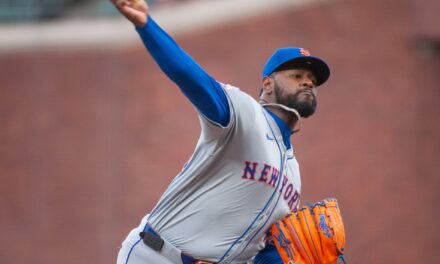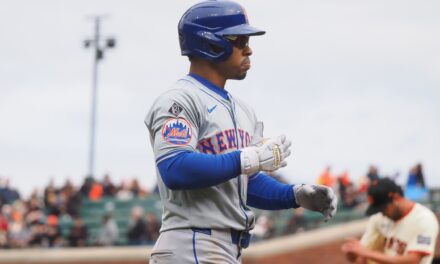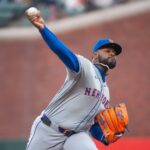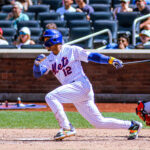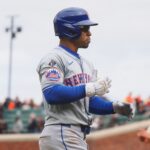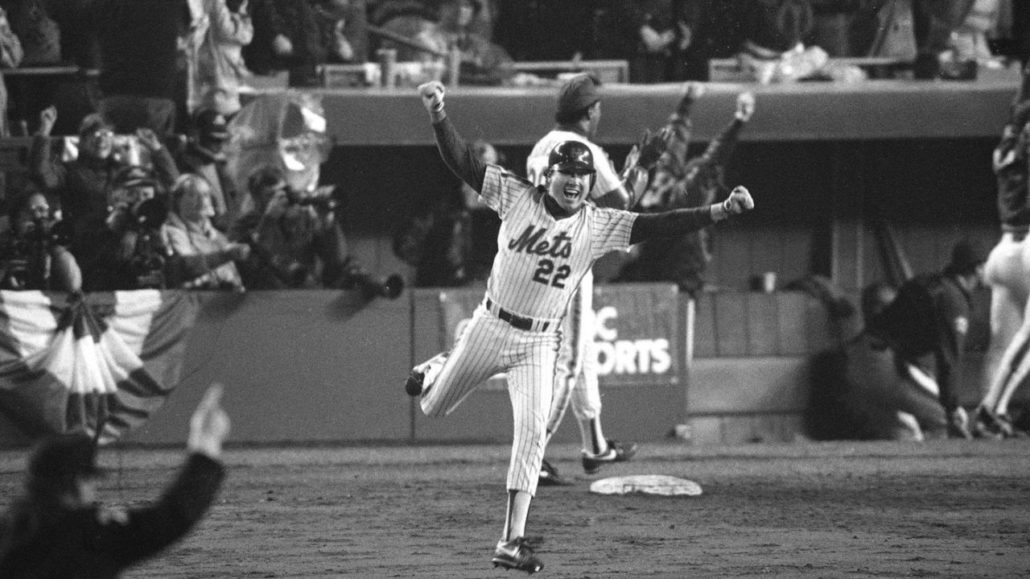
“Little roller up along first. Behind the bag. It gets through Buckner! Here comes Knight, and the Mets win it.”
Listening to the melodious call by legendary Hall of Fame broadcaster Vin Scully will forever arouse fond memories for Mets fans, as the 1986 World Champion Mets squad is one of the most beloved and revered teams in major league history.
A team filled with many varying personalities and egos, with tremendous talent, heart and passion. One that literally played like each game was their last, showcasing their grit and fiery play into an unforgettable 108-win regular season.
It seemed as if every member of the 25-man roster played a key role in aiding in the team’s success. Whether it was Darryl Strawberry and Gary Carter providing the power, Lenny Dykstra and Mookie Wilson with the speed, and a young vaunted starting rotation that was second in baseball in ERA, WHIP and strikeout percentage.
One such player that held a key role not only on the field but off it, was third baseman Ray Knight.
Acquired on August 28, 1984, from the Houston Astros, Knight provided the Mets with toughness, a strong character and a veteran presence to help keep the team in line.
Injuries derailed Knight in 1985, playing in just 90 games, but he came into camp in ’86 ready to win the starting job at third and prove he still had life in his 33-year-old bat.
There were early rumors that the Mets might release Knight to give Howard Johnson and Kevin Mitchell the opportunity to platoon at third. However, Knight came into camp healthy and in shape, and with a vote of confidence from his manager and longtime friend Davey Johnson.
Knight went on to post a slash line of .298/.351/.424, with 11 home runs (the first time he hit double-digit homers since 1980), 76 RBIs and a 115 OPS+. His 145 hits were second on the team behind only Keith Hernandez (171), and his 24 doubles fourth on the team. He also earned the N.L. Comeback Player of the Year award.
Of course, Knight was instrumental in helping the Mets win their second championship in team history, being named World Series MVP after hitting .391/.440/.565. He led all Mets in hits with nine.
One of those hits came in the bottom of the tenth in Game 6, poking a soft line drive into center field that scored Carter and moved Mitchell to third as the tying run. Of course, Red Sox reliever Bob Stanley uncorked a wild pitch to the ensuing batter, Mookie Wilson, with Mitchell coming home to tie the game at five. Knight moved up to second on the wild pitch and was getting a big lead off the bag.
A 3-2 count to Wilson, who had worked a nine-pitch at-bat, resulted in a dribbler down the first baseline, one in which Knight admits he didn’t see go through the legs of Bill Buckner.
Knight rounded third, waving his arms in the air in exuberant fashion, as he was mobbed at home by his teammates, who had just witnessed one of the craziest and most unthinkable comebacks in baseball history.
Knight returned in Game 7 and was the undoubted hero, going 3-for-4 with the go-ahead homer in the seventh off Calvin Schiraldi, who he had singled off of in the bottom of the 10th in Game 6 two nights prior.
The Mets were champions of baseball and riding high, hoping to form a dynasty and come back to the postseason for years to come.
Unfortunately, key pieces of the ’86 squad moved on, including Knight in 1987, who held out hope that he and the Mets could work out a new contract. The sides couldn’t come to an agreement on a new deal, with the Mets offering essentially the same salary as he earned in ’86. With no common ground, Knight moved on and signed a one-year deal with the Baltimore Orioles.
Knight returned to Citi Field last year for the 30th anniversary of the ’86 championship team. It was the first time Knight had taken part in such festivities, both due to scheduling difficulties and lingering ill-will between player and club.
Knight works as a member of the Washington Nationals broadcast team, this his 11th season with the Nationals.
I had the chance to speak with Knight before a game last week to discuss his time with the Mets, his memories from ’86, and if he has a desire to ever manage again in baseball.
MMO: When you were traded to New York in 1984 from the Houston Astros, what was your initial reaction and were you looking forward to playing in New York?
Ray: I knew Davey Johnson really well. I played against him and also early in that season [1984] we had played the Mets, and I saw Strawberry and Gooden for the first time and I saw the makings of a really talented team.
In Houston, I just got in a situation there where they moved me to first, and I had two really good years and then I was injured. I wanted to get out of there and I had like ten teams that I could be traded to. The Mets were one of those teams.
When they called me up to the office and told me about the trade I was elated. I wasn’t really sure how I was going to be used because Hubie Brooks was playing third and Keith was at first.
I knew Davey and we had spoken when they were at the Astrodome earlier, and I had told him that I just wasn’t really happy there. He told me, “Well, we could surely use a bat like you here.” That was just two friends talking and I said, ‘Make it happen!’
Some time later in August, it happened (the trade) and I was excited. I got the news that morning at about 7:30 a.m., and I was on a flight out of Houston by 11. I landed at Shea by about 5 and went straight to the park.
I was in the lineup and playing third and Hubie was moved to shortstop. I stayed at a hotel right there the whole last two months of the season, right across from the airport. I didn’t have the time really to get a house or apartment, so I just stayed in the hotel and went to the park every day. And we had a chance to win every day.
It was exciting and great to be a part of. I mean, I went from hitting third in Houston to hitting sixth and seventh in New York. [Laughs.]
All that young pitching was coming and I just knew with Davey and with all the young talent they had in the organization that we were going to be really good. Then when they acquired Gary [Carter] I said, ‘Oh my gosh, this thing could really, really just explode here!’
Then Dykstra develops and the next thing you know you have a guy like George Foster, who was a mainstay in that lineup, all of a sudden in late ’86 became disposable.

MMO: You had one of the best seasons of your career in 1986. What clicked for you in that special season, other than staying healthy?
Ray: I never stopped being able to hit. I hit .295 and .305 the two years I played every day previously, and then in 1984 I got hurt; I pulled a rib cage muscle and then a quad muscle. I had six cortisone shots that year and didn’t tell anybody I was hurt, even when I got to New York I was hurt. I just kept playing.
In ’85, I had my shoulder operated on and my elbow, so I just wasn’t healthy. It’s a lot like Ryan Zimmerman this year in that he has struggled the last couple of years after being a really great player all those years before. You can’t play if you’re hurt, not up to your capabilities and they were seeing a player that wasn’t hitting on all cylinders.
That winter of ’85, I always started working out early and I usually waited until after Thanksgiving, and then the next day after Thanksgiving I would go nonstop from then to spring training. Running, lifting, plyometrics, swimming and all kinds of things to be strong.
I was 32 and approaching my 33rd birthday and I knew that I could still hit. My arm wasn’t what it was and I continued to have this reoccurring problem with my right quad where I had torn it and never really got it repaired.
I got in such good shape that through lifting and dieting and everything when I went to spring training I was strong. Davey pulls me aside and says, “Man, you look better than you’ve looked since the early ‘80s.”
I said, ‘Davey, I’m strong. I feel good.’
And he asked, “Are you ready to play every day?” I told him I was.
We had HoJo there who had hit home runs but wasn’t hitting for average and was a little bit of a liability at third. Davey told me you’re going to be platooning with HoJo and I said, ‘I’m not a good player playing part-time. If you want me to hit .300 I need to play every day.’
He wanted to see how it would all play out.
The next thing I know about two weeks later there’s a big article in the St. Petersburg Times that says the Mets were going to release me. I was shocked. I was making almost $700K and to eat that kind of money I said, ‘I’m pretty bad.’
I sat down with my wife, at that time, over dinner and she said, “Ray, I’ve never seen you fail at anything. You’re healthy, block all that out of your mind and just go play.”
I said, ‘That’s exactly what I intend to do.’
We were having games and I kept hearing these rumors, and then one day Marty Noble came up to me and said, “Ray, Davey’s in your corner. I’ll just be honest with you, there are people that want to move you and give Mitchell that shot to platoon at third.” But he said Davey’s in your corner.
I talked to Davey and he told me I wasn’t going anywhere. He said, “You’re the heart and soul of this team. I know what you mean to the team, you’re here.”
We were playing in Orlando that night, and I hit a home run. The next day I hit a home run, I was hitting about .350 in spring. Catching everything, fielding like I was 20-years-old and then the season opens. We’re in Pittsburgh and we got rained out and HoJo was scheduled to play against the right-hander. Fast-forward a couple of days later, we faced a left-hander and I hit a home run. Fast forward, we faced three more left-handers in the next four or five days and I hit home runs in every game and I had six home runs by the first ten days.
We were playing the Pirates at home and we were down by two runs. Strawberry walks with two outs in the ninth and I turn around and I look and they brought in Cecilio Guante to face me. He threw about 95 mph. I looked thinking Davey was going to pinch-hit for me, and he pointed and said, “You go ahead. I want you to hit.”
I go up there and I don’t know that I ever felt more exhilarated, excited and pumped, and he threw me a 2-1 fastball and I hit a ball out of Shea Stadium. And from that day on, Davey told me that I was the everyday player.
Just a culmination of working hard and getting healthy, Davey having a lot of faith in me and luck. I got really lucky that first ten days that everything that I swung at I hit real far and I wasn’t a home run hitter. I was a power hitter but a doubles-type hitter, and here I go I hit six home runs in 10-12 games. They said this kid’s hot let’s play him, so I just kept playing.
MMO: Your single in the 10th inning in Game 6 of the ’86 World Series was huge, driving in a run to make it a one-run game and keeping that historic rally alive with two outs. Can you walk me through that at-bat and the emotions you had? How does one stay so mentally composed in those pressure-packed situations?
Ray: It’s all a part of experience and being in situations where the game’s on the line. I replaced Pete Rose in Cincinnati when he went to Philadelphia and that was a pressure-packed situation every day. There were actually fans rooting for me to fail because they loved him so much.
I’ve always had the ability to block things out and just trust in myself if I were healthy and I worked hard enough. It worked in Cincinnati and it worked throughout my career.
In that particular game, I will admit that you know we’re facing elimination and all of a sudden we’ve got two outs, and we’re a couple of runs down. I was the fifth hitter in the inning. Two outs now, I’m third [due up] and I’m in the hole. I’m in the on-deck circle while Gary’s hitting because there’s nobody out there, and next thing I see is Kevin Mitchell running out of the clubhouse buckling up his pants. He grabbed a bat and I eased out of the on-deck circle.
Gary walked by me and said, “I’m not making the last out.”
And I said, ‘I’m not making it either if it gets to me!’
So Mitch runs out, Gary gets a base hit, and Mitch goes up there with his pants half hitched up [Laughs], and he gets the base hit.
I go up there and it gets 0-2 on me. Schiraldi was a guy that threw really hard but I didn’t think that his slider could get me out unless he just bounced it. The on-deck preparation was not much; I was just watching the pitcher.
I was in that lock-down mode where nothing bothered me. I did look up at my wife and she was crying with her head down and had her hands clasped like she was praying. I put my hand up [to her] and said, ‘I got it, I got it.’ Sometimes family members and friends, it hits them a little harder than it hits you, and it was hitting me pretty hard!
I go up there and I get the two strikes on me. He throws me a fastball up and in and because I was protecting fastball, not trying to do anything but make contact, I was able to hit a line drive to center. I didn’t hit it that well, but it fell in. Honestly, my concentration level was so acute that I didn’t think anything negatively. I just saw the ball and tried to hit it. Fortunately, I got a hit, and then I go to second on a wild pitch.
Now Mookie’s up and I’m getting as big a lead as I can because the game’s already tied and I’m just going to be out at second. I’m not going to be out at the plate, so I’m getting a lead about eight feet bigger than I should.
They tried to pick me off and they would’ve had me picked off if they made a good throw, but the throw was high. I just kept getting a big lead and Mookie’s battling, and finally, he hits that ground ball to first.
I will admit it, I kind of conceded in my mind because it looked like a routine ground ball. I started running toward third and I look back over my shoulder and I didn’t see the ball go through Buckner. I heard Buddy Harrelson saying, “Go, go, go!”
As I touched third base and looked over my shoulder, I saw the ball bounding to right field and it was like I was on a magic carpet. I don’t ever remember my feet hitting the ground. It was an out-of-body surreal experience! I jumped on home plate and the whole team mauled me. It’s just an experience that I’ll never experience again, and it was just overpowering emotion.

MMO: What was it about that ’86 team that you guys gelled so well together and are considered one of the best teams in major league history?
Ray: I think that, without a doubt, almost to the man, every player on that team was a warrior. They fought hard and they played hard. It was almost a competition between each of us who was going to be the best player on that particular day.
It was just a mindset, and it doesn’t hurt to have that kind of talent. I mean, come on, when you have Gooden, Darling, Sid and Ojeda heading up your rotation and McDowell and Orosco in the bullpen. And gosh, one of the greatest catchers of all time in Gary Carter. Keith was in the prime of his career, a hitting machine! Then you add Dykstra, Backman, Strawberry, and me. Tim Teufel played a huge role on that team and Mookie. Then you go to our bench and Danny Heep, Mazzilli later and Kevin Mitchell; he played short, third, second, and left field. It was just a group of really, really, really talented people that had the same mindset.
By the time we got to spring training, Davey didn’t say hey guys we’re going to win the pennant, he said, “We’re going to dominate.” And dang, we went out and by the All-Star break, we’re fifteen games up or so.
Just a combination of a lot of things: ability, a great manager and mindset.
MMO: In 1987, you signed with the Baltimore Orioles right before spring training. How difficult was it to leave New York? Do you believe that if the front office kept the roster together you guys would’ve had a chance to repeat and become a dynasty?
Ray: Well gosh, that’s been my contention for all these years and really why I never had a close relationship with the Mets, although it is mended. I didn’t take it personally for leaving there, I took it collectively because I left my buddies, my friends, my world champion partners in a city that treated me great.
I loved Baltimore, I loved the Orioles organization, but that was a collusion year, and I didn’t even have an open chance for free agency. That wasn’t what caused me to be bitter. The fact was that you pour your heart out for somebody and you produce, you have a great year, your team has a great year which always is the most important thing, and you want to be a part of that.
We all felt – when we were in the ticker-tape parade in New York when there were 2-3 million fans out there – invincible. We didn’t feel like our team was going to be broken up. We went to a party that night after the parade and we were all looking forward to next year and winning the pennant by more games.
There’s no reason to break the ball club up, there wasn’t. And yet, Mitch was gone, and then I was gone. And we were two people that, they didn’t realize with that many personalities, Mathew, that somebody had to keep those personalities in line, and it had to be strong personalities that were respected. And Mitch and I were respected.
Gary and Straw didn’t get along. Gary was my best friend and I was close with Straw, so I was able to keep them from being at each other all the time. We had a bus trip to St. Louis and Gary was taking pictures with fans and we’d been on the bus for six or seven minutes. Straw got impatient and yelled out the window, “Hey, Camera Carter, get your ass on this bus! We’re not waiting on you any longer.”
Gary gets on the bus and he is mad as a hornet. I happened to be sitting in the middle of the bus, Straw was at the back. Gary was coming in the front and here they come at each other like raging bulls! And I just stepped up out of the seat and both of them respected me enough that I turned to Straw because I knew Gary would stop. I turned to Straw and said, ‘You get your butt back to your seat and be quiet!’ He always called me Ray Ray, and he said, “Okay, Ray Ray.” He went and sat back down.
That was just a small example. I mean, you don’t know what would’ve happened if I wasn’t there. Surely someone else would’ve stood up, but Mitch was the same way. Mitch kept everybody together.
When I first got there they said that Mitchell was going to be the person that brings the clubhouse down because of his habits. Kevin Mitchell is as good a guy as there was. He didn’t go out and drink and run and carouse. Whatever business he did was in the privacy of his room and he was a great teammate. He was a big factor on that ball club and a big presence on that ball club. He and I became extremely close and still close to this day. But because he was from San Diego and had gotten shot, his cousin was killed, everybody thinks that he’s a gangster. He wasn’t. He was just a sweet man that didn’t want anybody to run over him and wouldn’t allow anybody to run over anyone else.
I’ll never forget the fight we got in at Cincinnati with Eric Davis. You got their whole team running at me and I felt two people’s presence in that fight: it was Gary grabbing Milner who had come off the bench to try and blindside me, and then Kevin Mitchell.
MMO: I’ve read many articles and listened to interviews where players, even to this day, hold you in such high regard as a team leader. That’s got to mean so much for you, to have earned such respect from them.
Ray: Well it does. It does make me feel good. There’s not a better feeling in the world than to have teammates respect you, and I knew that I was respected and that’s what mattered the most.
MMO: You had mentioned that your relationship with the Mets has mended some. You took part last year in the 30th anniversary of your 1986 Championship team, how good was it to be back with your teammates? Would say that your relationship with the Mets has improved?
Ray: I do, I definitely do. It was a good time and I enjoyed it and hopefully all that’s behind us.
MMO: You managed with the Cincinnati Reds in the late ’90s, would you ever consider managing again?
Ray: I would, I would. I had an opportunity to manage Houston like three years later and I chose not to. But yeah, I would always want to manage again but I think it’s probably past my time. I love managing, I love to be a head of the organization making decisions and having that responsibility.
I had my opportunity, I had two years in Cincinnati. It wasn’t ideal because Mrs. [Marge] Schott was not about baseball and ended up more frustrating than anything else. But of course, I would always entertain managing.
I’m single now and it wouldn’t be a strain like it would’ve been then because your family takes such a hit when you’re managing. It’s a tough task but it’s like anything else, the more you have to give and sacrifice the more meaningful it is to you. I relished the opportunity to have managed and if that chance ever comes along again I will certainly entertain it, but I doubt that will happen.
MMO: Now you’ve been broadcasting for the Washington Nationals, how have you enjoyed being a part of the media? What are some of the things you’ve learned about the broadcast world over the years?
Ray: I knew nothing about it, so everything I’ve learned. Addressing the camera, more about how to listen when somebody’s talking in your ear, and being able to talk at the same time, that’s kind of hard. Knowing the traffic and the commercials and knowing that you only have 30 seconds or 12 seconds and you’ve got to answer something and you’ve got to be out in 12 seconds.
I’m a chatterbox anyway, and the toughest thing for me to do is be succinct sometimes. I’ve learned not to necessarily do it in my everyday life but on TV there is a hard 20 seconds, or 30 seconds meaning that when they say 15 [seconds], it’s 15 and you’re off the air. I have to formulate my thoughts quickly and they have to make sense and I have to get them out in complete sentences and then get out of there for the commercials.
When addressing the cameras, you have to talk as if you’re in somebody’s living room, and you look them right in the eye but also not forget about your host, make sure you include him or her in the conversation. Look at them as you’re talking to make sure the people at home think that you’re addressing them and then you look back in the camera and it’s all a conversational thing.
There are a ton of things that you have to learn, but I learned through just being thrown in the fire. I was hired on a Wednesday, and I flew to Wichita, Kansas, on a Thursday. I did a Friday night Wichita State/Georgia Tech game, a Saturday game and then a Sunday doubleheader, ironically with Bob Carpenter, our play-by-play guy [for the Nationals].
I was hired and flew to do a game without any experience, and you learn pretty quickly. You make a lot of mistakes, but you just try not to make them more than 100 times. [Laughs.]
MMO: Thank you again for your time today, Mr. Knight. It was a pleasure to speak with you.
Ray: Thank you so much, Mathew.
You can follow Ray Knight on Twitter, @RayKnight25




